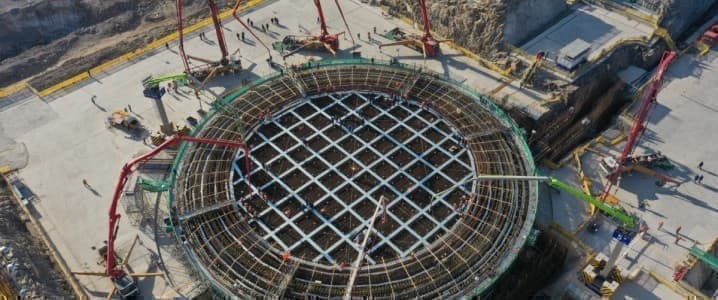The Shidaowan nuclear power plant, which features the world’s first fourth-generation reactor, started commercial operations on December 6, China National Nuclear Corporation (CNNC), one of the project’s developers, said.
“China’s independently developed high-temperature gas-cooled reactor demonstrator commenced commercial operation,” CNNC said in a statement.
“It signifies that China has completed the world’s first commercially operational modular nuclear power plant with fourth-generation nuclear technology, marking the transition of fourth-generation nuclear technology from experiments to the commercial market.”
Generation IV reactors are considered safer and more efficient.
“The tests confirmed that commercial-scale reactors could be cooled down naturally without emergency core cooling systems for the first time in the world. It is the so-called inherently safe reactor,” Tsinghua University, one of the joint developers of the reactor, said.
Such reactors can produce heat, electricity, and hydrogen and would help China and the world “become carbon neutral,” Zhang Zuoyi, dean of the Tsinghua University Institute of Nuclear and New Energy Technology and chief designer of the Shidaowan reactor project, told South China Morning Post.
The fourth-generation reactor in operation now puts China “ahead of other countries in terms of nuclear technology research and development,” Francois Morin, China director of industry group World Nuclear Association, told The Wall Street Journal.
According to Morin, Western countries are set to launch their fourth-generation nuclear reactors only in the early 2030s.
David Fishman, a China-based senior manager at energy consulting firm Lantau Group, told the Journal that “China is arguably peerless in actually building and commercializing next-generation nuclear power technology.”
Many countries in the West, with the notable exception of Germany, have recognized that nuclear power generation would help them achieve net-zero emission goals.
At the COP28 climate summit currently underway in Dubai, the United States and 21 other countries pledged to triple nuclear energy capacity by 2050, saying incorporating more nuclear power in their energy mix is critical for achieving their net zero goals in the coming decades.
The United States, alongside Britain, France, Canada, Sweden, South Korea, Ghana, and the United Arab Emirates (UAE), among others, signed the declaration at the COP28 climate summit.
“The Declaration recognizes the key role of nuclear energy in achieving global net-zero greenhouse gas emissions by 2050 and keeping the 1.5-degree Celsius goal within reach,” the U.S. Department of State said.
China is not a signatory to that declaration, but it aims to develop more nuclear energy capacities to reduce emissions as its demand for electricity rises. 
As of 2020, nuclear energy accounted for 5% of China’s generation mix, which continued to be dominated by coal, per data from the World Nuclear Association.
By 2035, nuclear energy is expected to make up 10% of the electricity generation mix and 18% by 2060, Chinese media quoted the China Nuclear Energy Association (CNEA) as saying earlier this year.
As of September 2023, China had 55 nuclear power units in operation with a combined installed capacity of 57 GW, and 24 units under construction with a total installed capacity of 27.8 GW, Xinhua quoted CNEA official Wang Binghua as saying. By 2060, that capacity is expected to jump to 400 GW, the official said.
China is also expected to approve six to eight nuclear power units each year “within the foreseeable future.”
Two safety demonstration tests were conducted on the two reactor modules, each at a power of 200MWt, on August 13 and September 1, respectively. The normal energy transfer driven by power was stopped during the tests. The measured nuclear power and temperatures within the different reactor structures, described how the reactors were naturally cooled down, without human intervention or emergency core cooling systems. The tests confirmed that commercial-scale reactors could be cooled down naturally without emergency core cooling systems for the first time in the world. It is the so-called inherently safe reactor.
The major purpose of HTR-PM is to co-generate high temperature steam up to 500℃ and electricity. It is currently cost-effective in the Chinese market to supply steam and electricity for the petrochemical industry to substitute the burning of natural gas and coal.
According to Morin, Western countries are set to launch their fourth-generation nuclear reactors only in the early 2030s.
I remember back in the late '00s when I was told HSR would be here in the '20s. This shit is never going to happen. We’re simply going to outsource everything to China and let them take care of it, while periodically waging our fists and insisting we’ll start a war with them if they don’t get in line.
I have a feeling that in China they somehow are able to push through the permitting issues and environmental reviews (if they have any) that have made new nuclear plants in the US at least so economically difficult that no one wants to back them. Just something about that system of governance that makes projects like this happen…can’t quite put my finger on it. Wait, you’re saying that they probably don’t have a million interested parties that can stop the project at any part of the development? Or maybe the dissent just…doesn’t matter?
https://pnhp.org/news/gilens-and-page-average-citizens-have-little-impact-on-public-policy/
When the preferences of economic elites and the stands of organized interest groups are controlled for, the preferences of the average American appear to have only a minuscule, near-zero, statistically non-significant impact upon public policy.
In the United States, our findings indicate, the majority does not rule — at least not in the causal sense of actually determining policy outcomes. When a majority of citizens disagrees with economic elites and/or with organized interests, they generally lose. Moreover, because of the strong status quo bias built into the U.S. political system, even when fairly large majorities of Americans favor policy change, they generally do not get it.
It’s fake. It doesn’t work. They skipped safety procedures. It’s not efficient anyways. It’s not scalable. It wouldn’t work without state funding. State funding is the reason it doesn’t work. Social credit score.
Can’t wait for r/science and r/China to be suddenly populated by Nuclear physicists who can vaguely gesture at this particular model being completely unsafe and just an inefficient money pit made for the unscrupulous Chinese to steal more money and how actually Western stagnation is the best model for reliable and cheap energy
So nuclear reactors - like all thermal power plants - already produce heat that can’t be further turned into electricity. This is sometimes used to heat cities (district heating). For instance, Haiyang Nuclear Power Plant heats 200,000 homes. The only way to produce hydrogen in a sustainable manner is through electrolysis. This requires a boatload of electricity and is the reason why most hydrogen is produced from hydrocarbons instead. However, electrolysis can be done more efficiently at higher temperatures. High temperature nuclear reactors such as this one can use their waste heat and electricity in order to produce relatively cheaper green hydrogen. Only a few high temperature gas cooled reactors have been built, and zero very high temperature ones (over 750°C). I think this is the only currently operating full-scale commercial one (as opposed to research).
Finally, I think this design is suitable for use in inland China. IIRC after Fukushima they canceled inland plants until improved designs were ready.
Maybe we could refine the way we do hydrogen separation than making exclusion zone roulette boxes? Surely there are better ways if the research is put into it.
We could cover a shit ton of land and water in wind turbines and solar panels and use that electricity for less efficient electrolysis, but unfortunately those cause a ton of death as well as create exclusion zones too.
I worked on nuke reactors. I left it after I saw the carelessness and mountains of bullshit in the community. There is no such thing as a safe nuke reactor. I don’t care how many times they claim to have redesigned the unsinkable Titanic and THIS time, surely they worked out all the kinks. Fukushima was supposed to have been the anti Chernobyl with the nEgAtIvE coefficent of reactivity. How’d that work out? Be it nature, human error, or something out of their control that they thought would never happen. All it takes is one.
Every nuke reactor built is rolling the dice. Go put he money in fusion. At least when that blows it’s not going to be a multi generational exclusion zone or needing to irradiate the ocean where your food supply grows.
Wasn’t China one of the more vocal, and rightfully so, critics of dumping all that radioactive slop where their waterways were?
But I know I’m talking to a
 but I get upset with the arrogance of thinking adding more of those loaded guns is some sort of celebration.
but I get upset with the arrogance of thinking adding more of those loaded guns is some sort of celebration.If there’s arguments that solar is better, sure, I’m sympathetic to those. I can understand if nuclear technology is not safe enough yet for widespread use. I think that arguments about nuclear being inherently unsafe are not convincing, though. As long as each reactor is safer than the last, we can minimize that inherent unsafeness. To take an example from programming: the only bug-free program you’ll ever write is a hello world program. Introducing complexity naturally increases the amount of unaccounted for states. Cutting-edge medical technology is invariably going to have an astronomical amount of unaccounted for states and the bugs that come with them. That doesn’t mean computing has nothing to offer medicine, only that its use must be weighed against alternatives. Fusion might be less inherently unsafe but AFAIK it’s not on the table right now, and we need energy today. China’s investing in nuclear technology, but it hasn’t been neglecting wind and solar, either. Putting feelers around each solution just seems like the no-brainer thing to do.
So are you saying that in your opinion, all nuclear reactors, which includes this one developed by this team of researchers and engineers, are unsafe because you’ve seen the careless disposition of other people in the workplace(s) that you worked in? What exactly about this qualifies you to make all the other claims you’re making?
But, why has no one pointed out the obvious chauvinism or overt racism in your comment? You are saying that no nuclear reactor designed thus far has been safe, and therefore this one made in China must also be unsafe, or that these scientists and engineers in China must be lying or over hyping the claims they are making. Concerning the technical limitations you are trying to gesture at, you can only come to the conclusion you are coming to if you think that there is something about China, or Chinese people, that forbids it from doing science and engineering better than wherever you come from. Concerning the only thing of substance you make a claim of knowledge for, you are saying that there is something about China or Chinese workers that forbids them from actually giving a fuck about their jobs as nuclear reactor technicians, scientists, and engineers, such that they strictly could not design safer processes or conduct themselves in an appropriately professional way better than wherever you come from.
Moreover, I don’t really understand why you think other people should listen to your perspective on the matter when you have put basically 0 effort within your comment to give any real justification. Essentially you are saying “I worked with these things, so just simply trust me.”
chauvinism or overt racism in your comment
I reject that framing. What I said was pointing out China’s legitimate concern for nuclear contamination in their waters, near waters, and the waters of the world which effect us all - namely the Pacific ocean. They clearly understand the risks associated with these plants, and they still build them. This is not racism, or jealousy, or some form of pvert nationalsim. This is critism of a risk assesment.
I don’t want
 or anyone else building these roulette machines either. This has nothing to do with “China bad.” No nation, engineering firm, or corporation is going to book smart out Murphy’s Law. They rolled that dice with Fukushima thinking what happened would never happen or the risks were too remote. It is simply a risk calculation that has played out multiple times in my life already, and even working / operating the reactors only made me see those risks more clearly to the point I switched careers. The industry itself is poisioned and deluded. Humans should move on from these devices. That is my random internet person assement.
or anyone else building these roulette machines either. This has nothing to do with “China bad.” No nation, engineering firm, or corporation is going to book smart out Murphy’s Law. They rolled that dice with Fukushima thinking what happened would never happen or the risks were too remote. It is simply a risk calculation that has played out multiple times in my life already, and even working / operating the reactors only made me see those risks more clearly to the point I switched careers. The industry itself is poisioned and deluded. Humans should move on from these devices. That is my random internet person assement.There is no need to get into a personal accusatory slander or sea lioning troll fest over this.
I mean the alternative is the literal and guaranteed disruption of the planet’s ability to sustain human civilization. It would be nice if we could magic up enough energy to meet society’s demands or return to monke without hundreds of millions starving to death, but that’s not a real option.
I wanna live in China so fucking bad dude
I watch videos from on YouTube from the Walk East channel and it makes me feel like the US is a rural backwater.
Do you all know any good channels for going around the US that aren’t reaction bait like Cash Jordan / wranglerstar strolling Portland while uttering nonsense?
This channel is pretty good, but it’s heavily focused on NYC and its surrounding neighborhoods. He does venture out to other cities though, both in the US and abroad. He also does bike rides which is why I started watching it to get a feel for the routes before I rode them.












